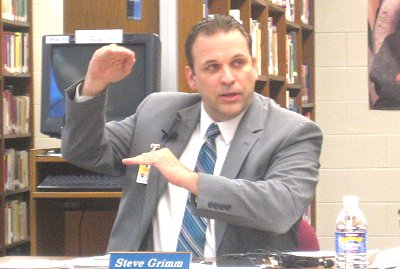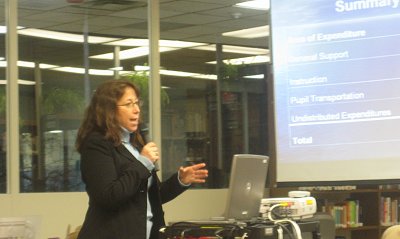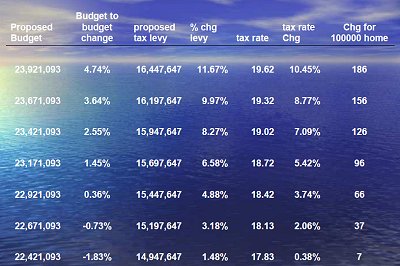- By Dan Veaner
- News
 Print
Print  The good news is that the Lansing School District will be spending $30,000 less than budgeted for this year, and a 'rollover budget' -- what it would cost next year to pay for what we have this year -- would only mean a 4.74% rise in the budget. That is certainly a good starting point that would require palatable cuts to reach an acceptable rise in the 2009 school budget tax levy.
The good news is that the Lansing School District will be spending $30,000 less than budgeted for this year, and a 'rollover budget' -- what it would cost next year to pay for what we have this year -- would only mean a 4.74% rise in the budget. That is certainly a good starting point that would require palatable cuts to reach an acceptable rise in the 2009 school budget tax levy.The bad news is that cuts in New York State aid will mean a hole in projected revenues that exceeds $600,000. "The rollover budget is about 4.74% higher than this year," School Superintendent Stephen Grimm told the Board of Education Monday evening as they got a first look at projected numbers for next year. "But then revenues come in and they're not all there. Because the State kept it."

Superintendent Stephen Grimm explains how rollover
expenditures higher and revenues lower will mean
significant cuts in Lansing's 2009 school budget.
Revenue is going to be a big problem for Lansing in developing next year's budget. After cutting more than a million dollars in last year's budget process, the district will have to do it again, forcing layoffs and more belt-tightening. According to a presentation by Business Administrator Mary June King state aid will be down an estimated $488,991 next year. Federal aid will be down an additional $10,000. And revenues from miscellaneous sources including investments will be down $373,924, just over half of what they yielded this year.
That rollover budget would mean $23,921,039 next year. That could mean an additional $2 million that taxpayers have to come up with if the budget is raised by about $1 million. By that calculation the tax rate would rise 10.45% to $19.62 per thousand dollars of assessed value.
King presented a chart showing seven alternative budget amounts, lowering each in $250,000 increments with the $23.9 budget as the highest, and a $22,421,093 budget at the low end. That low end would result in a -1.83% budget to budget change, raising the tax levy by 1.48% and the tax rate to $17.83. The school board is faced with choosing one of those amounts and convincing taxpayers to pay for it.

Business Administrator Mary June King presents 2009 estimates
The state contingency budget of 4% won't make that task any easier. In Lansing it would mean around a 9% tax rise. Contingency budgets are enforced on districts that vote against the budget proposed by their school boards. "Our job is to get it below that," said school board member David Dittman. "That's not even a thought process, because that's way too high."
Salaries cost the district $10.7 million this year, with an additional $5 million for benefits. That would translate to $11.4 million in salaries and $5.3 million in benefits next year if all current jobs are retained. Grimm said that Lansing knows how to make large cuts because of the process the district went through last year. But doing so last year means the choices for this year and coming years are going to be harder than some other districts will face.
King commended Grimm for being open with the community during last year's budget process. "I really appreciated the lack of smoke and mirrors," King said. "He really was out there, he was transparent, and he involved a lot of people. I think that was critical. When I decided to become a business administrator a lot of it was because I was reacting against seeing that model of trying to hide things."

This chart shows how seven potential budgets will affect
taxpayers wallets when the bill arrives next summer.
The chart is part of the presentation King made Monday.
The full presentation is posted on the district Web site .
Grimm said the numbers are preliminary based on estimates of amounts that won't be set until some time in the future. For example the district can't know what the exact level of state aid will be until the Legislature votes. King said her numbers are conservatively based on what Patterson has proposed.
"It's not precision," Grimm warned. "These are all guestimates right now. But as we move forward putting this together over the next eight weeks we're going to have a living, breathing process."
"It's not our fault, it's not the school system's fault, it's not the state's fault -- it's the economy's fault," Dittman said. "I guess we're just going to have to act in the way that everybody else is acting in the economy."
----
v5i5



